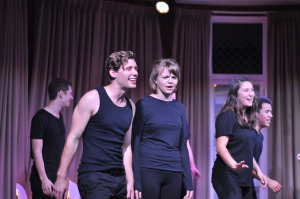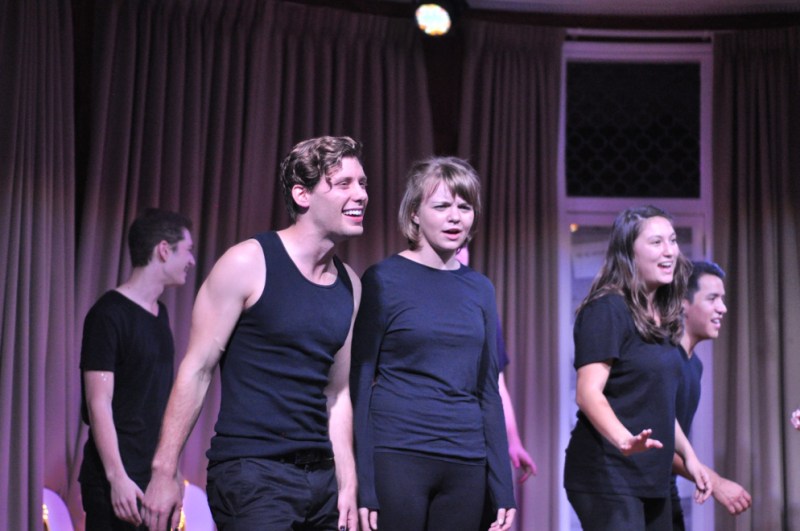The musical cabaret “Did We Offend You?,” which was performed last weekend to sell-out audiences, was not the show that director Benina Stern ’16 had in mind when she proposed her idea for a musical last spring.

Stern received a Spark! grant from the Stanford Arts Institute and funding from the student group At The Fountain Theatricals (ATF) to put on “Bloody Bloody Andrew Jackson,” a Broadway musical that is a retelling of Andrew Jackson’s presidency. However, following concerns about the musical, including its representation of Native Americans, and treatment of issues such as depression, suicide and alcoholism, the production was canceled.
The Cancellation of “Bloody Bloody Andrew Jackson”
At the beginning of this quarter, Stern and the show’s co-producers, Elizabeth Knarr ’16 and Emily Ashton ’16, were contacted by the co-chairs of the Stanford American Indian Organization (SAIO) Ashley Harris ’16 and Dahlton Brown ’15 to discuss concerns that Harris and Brown had with the show.
Stern, Knarr and Ashton met with Brown, Harris and other SAIO affiliates in the first meeting.
Stern said that the SAIO students brought up criticisms of the musical with which she was mostly familiar, having researched previous critiques in the hope of using the musical to create a positive dialogue on campus.
“I don’t do theater just to say we put on a show, I do theater to have a conversation and to learn,” Stern said. “I wouldn’t have pitched this show if I didn’t think something could be said about it and problems brought to light that a lot of the Stanford community does not think about.”
However, while Brown and Harris both said that they believe Stern and her producers had good intentions, the misrepresentation of Native Americans and satire of serious issues, which included genocide, would negatively affect the Native American community on campus.
“[‘Bloody Bloody Andrew Jackson’] more or less uses Native Americans as a prop to tell the story of Andrew Jackson and his controversial presidency,” Brown said. “It uses Native people as a foil, or a backdrop to tell his story, which we felt took away from the legitimacy and historical narrative that is very real and exists for a lot of Native students on this campus.”
Stern and her team proposed a variety of potential solutions to ensure that a positive dialogue came out of the show, including cutting certain songs and making small script changes, or finding a show written by a Native American author to be funded by ATF and put on in conjunction with “Bloody Bloody Andrew Jackson.”
After a month of meetings, which included Stern, the co-producers, SAIO, ATF and various faculty moderators, it became clear that the problems of representation in “Bloody Bloody Andrew Jackson” could not be fixed.
“We had a hard time working around the fact that there’s only so much you can do to work around one of these pieces until it’s not that piece anymore,” Brown said. “As those conversations progressed, it became apparent that we weren’t comfortable with any variation of the play.”
The decision was made to cancel the show. Stern and Sammi Cannold ’16, the artistic director of ATF, said the decision was driven by a variety of factors, including consideration for the potential impact the musical could have on students of the Native American community as well as potential repercussions for the cast of “Bloody Bloody Andrew Jackson.”
“In conversation with the Native American community, they made it clear to us that if we were to continue with the show, it would emotionally isolate members of the Native American community on campus,” Cannold said. “Were this not an academic setting, I personally would have made the decision to go on with the show, but on a university campus our obligations are different. I don’t think it’s fair for us to alienate members of the community.”
Cannold and Stern were also worried about the impact of the show on the cast, especially after SAIO told them that the production would possibly be protested. Brown said that in the meetings, SAIO made it known that if the production went on stage, it would likely be protested by both the campus and Bay Area Native American communities. Similar protests were organized at universities such as the University of Michigan when “Bloody Bloody Andrew Jackson” was performed.
“For students who are hoping to have careers in anything, having their name tied to anything that is misconstrued and offensive and has all these things associated with it would be unfair of us to ask them to do,” Cannold said.
Ultimately, Stern, Knarr, Ashton and Cannold all emphasized that respect for the Native American community was at the core of their decision.
“We were really hoping to find a way to do the show in a way that would promote dialogue and not hurt people, but it would not be possible,” Knarr said. “None of us wanted to feel responsible for hurting other students or making them feel attacked in a place that’s supposed to be their home.”
The Creation of “Did We Offend You?”
In place of the musical, Cannold and Stern came up with idea of creating a cabaret show that featured controversial songs in musical theater, including songs from “Bloody Bloody Andrew Jackson,” “Rent,” “The Producers” and “The Book of Mormon.” Stern and Cannold both said that it was important to them to still give the cast an opportunity to perform, and that they were worried that an important conversation would be lost if the show had simply been cancelled.
“We weren’t really content with cancelling the show and moving on, because we had tons of questions left, like what can we present in art, and what’s offensive and what’s not offensive? So that’s where ‘Did We Offend You?’ came from,” Cannold said.
“Did We Offend You?” was created and rehearsed in four weeks, a timeline that Knarr and Cannold described as almost unheard of in the musical theater world. But according to Stern, despite the time constraints, it was important to them not to let down their cast members, many of whom had turned down roles in other student productions in order to do the musical.
At the front of everyone’s minds, however, was the feeling that the theme of offensiveness and representation in the arts needed to be explored.
“We ended up thinking about the process and what it meant to us, and a lot of people had questions about what can be done in art, and when does something controversial cross the line into offensive,” Knarr said. “The title ‘Did We Offend You?’ is a genuine question. It’s not supposed to be snark or rude, it’s really a question, was this offensive or not?”
Brown and Harris said they were pleased with ‘Did We Offend You?’ and the issue of representation the piece brought up.
“I was really supportive of what [ATF and the ‘Bloody Bloody Andrew Jackson’ team] decided to do, it’s an important conversation to have — who can say what on stage, and who can say what in general?” Brown said.
The Impact on Campus
Among the broader discussion created on campus as a result of “Did We Offend You?” was an article sent out on Nov. 17 by the Fountain Hopper, a student-produced email newsletter.
The article, which didn’t directly quote any sources, called the cancellation of ‘Bloody Bloody Andrew Jackson’ “creative and artistic censorship.”
One allegation in the article was that SAIO threatened to block people from entering the theater if the production was staged, while in reality SAIO had warned that there would likely be a peaceful protest.
“The main problem is [the Fountain Hopper] published all this misinformation. If they had raised the question [of censorship] that would have been fine, I’m open to those discussions and our community is open to those discussions,” Harris said. “When it comes down to it, if you publish misinformation that we perceive as an attack on an entire community, that’s a problem.”
Knarr expressed equal frustration with the article.
“No one from the Fountain Hopper contacted anyone from our team,” she said. “I think the whole process does bring up questions about, ‘When is it okay to say that something artistic should not be put up?’ but I did not come away from this process feeling like my freedom of speech had been restricted.”
“The big thing everyone has to remember about this is that in general, any art should be able to happen, but we’re part of a campus community,” Ashton said. “Yes, we thought it should be able to go on, but you have to be able to see other points of view.”
Brown said that the discussions were respectful and focused on an academic view of the issue at hand, and the outcome demonstrates the positive relationships that developed between the members of SAIO and the ATF team.
“We don’t have the power to censor anybody,” he said. “We voiced our concerns and they heard us. Which is huge.”
Brown said the he is also concerned about the negative effect the Fountain Hopper’s article may have on the perception of SAIO on campus, since SAIO is a special fees group and their funding must be approved by the student body.
“We don’t want to be defunded because people think we’re these censoring radicals,” Brown said.
Moving forward, both groups of students said that they think the decision to cancel “Bloody Bloody Andrew Jackson” and put on “Did We Offend You?” will lead to more communication between student groups when staging productions that deal with cultural representation.
“This is an issue that we encounter again and again in art,” Cannold said. “For those of us who are hoping to go into it, I’m sort of grateful for this experience because I learned a lot from it.”
However, the ethical question of when potentially offensive art should or shouldn’t be acceptable remains unanswered.
“In terms of the Stanford community and relations between different student groups and administration, this choice was the right choice,” Stern said. “It was a hard choice, and it still is a very opinionated, debatable choice, and everyone can come at it as they will.”
Contact Katie Zingheim at zingheim ‘at’ stanford.edu.
